The measure of an effective convention is the size and durability of the boost (if any) it produces in the nominee’s support. Early polling results suggests Donald Trump may have received a small boost in his support from the recently-concluded Republican convention, mostly from previously undecided Republicans, but it’s still too early to judge whether, and how much, it improved his chances in November. This hasn’t stopped pundits on both sides of the political aisle from rendering their own verdict, however premature, of course. Here’s my take, based on my brief time in Cleveland, capped by a ringside seat (if sitting in the nosebleed seats counts as ringside) to watch Trump’s lengthy, and loud, acceptance speech.
The goal of any party convention is to unify the party behind the presumptive nominee, and to articulate the major themes on which the candidate will run in the general election. For the most part, I thought Trump accomplished these objectives. I flew into Ohio expecting to see a very divided set of Republican delegates, and braced for major demonstrations in the streets. Neither expectation was met. In fact, despite the media’s tendency to focus attention on dissenting delegates and other controversies (see coverage of Melania’s partly plagiarized speech), this was a relatively tame event. Once Trump’s team, allied with the Republican Party leadership, beat back an early effort to amend the rules to allow the delegates to vote their conscience, the battle for the nomination was essentially over. The state roll call on Tuesday went relatively smoothly, with New York’s delegates, as announced by Trump’s son Donald, putting Trump over the top to become the party nominee. Similarly, while Ted Cruz’ failure to endorse Trump received a lot of airtime on the cable shows, it wasn’t clear to me (I wasn’t in the arena for this) that it played all that well with most delegates. In my view, Cruz’ decision not to endorse was made with an eye toward his bid for the presidency in 2020, on the assumption that he won’t be tainted when Trump is defeated come November. I suspect it will have little impact on the 2016 race.
Perhaps equally surprising, I saw little evidence of sustained protests against Trump on the streets. To be sure, there were organized demonstrations held nightly at the public square a short distance from the Quickens Loans Arena, but they were largely peaceful and mostly out of site to delegates entering the arena. Perhaps the most boisterous opposition I saw was by religious groups that evidently viewed Trump’s candidacy as a harbinger of a coming apocalypse.
https://pbs.twimg.com/media/Cn6xCdOWcAAHzJp.jpg
There was an incident in which a protester tried to burn an American flag near the convention arena entrance, but according to the waitress I talked to in Flannery’s Irish Pub who saw the event, he wasn’t even able to ignite the flag – but did ignite himself – before police wrestled him down. Protests that same night led to maybe two dozen arrests. The next day security was significantly beefed up in that area, including the use of mounted police, and I didn’t see any significant protests as I entered the arena that night.
On the whole, this man holding a sign proclaiming that “Trump eats farts” while posing for pictures with one of Cleveland’s finest pretty much sums up the tenor of the protests that I saw in Cleveland.
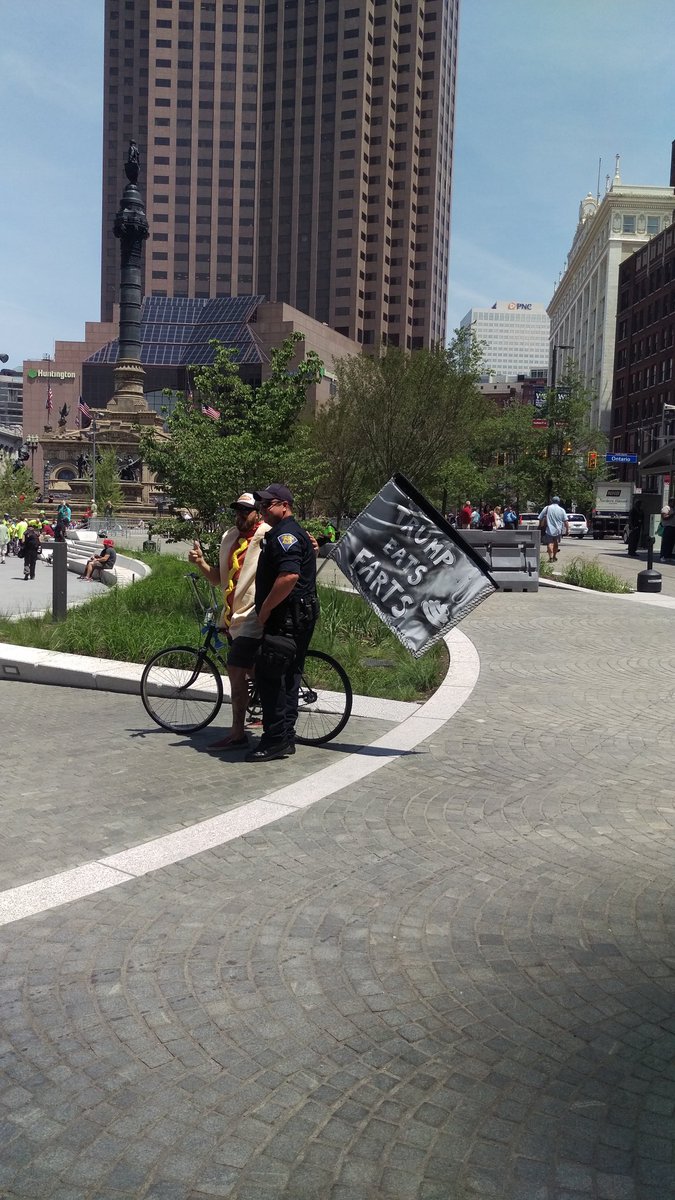
It may be that the highly visible security presence deterred more violent protests. Indeed, security was tight all over. As I headed to the courthouse to pick up my security clearance, a platoon of some 40 or more officers came sprinting by me.
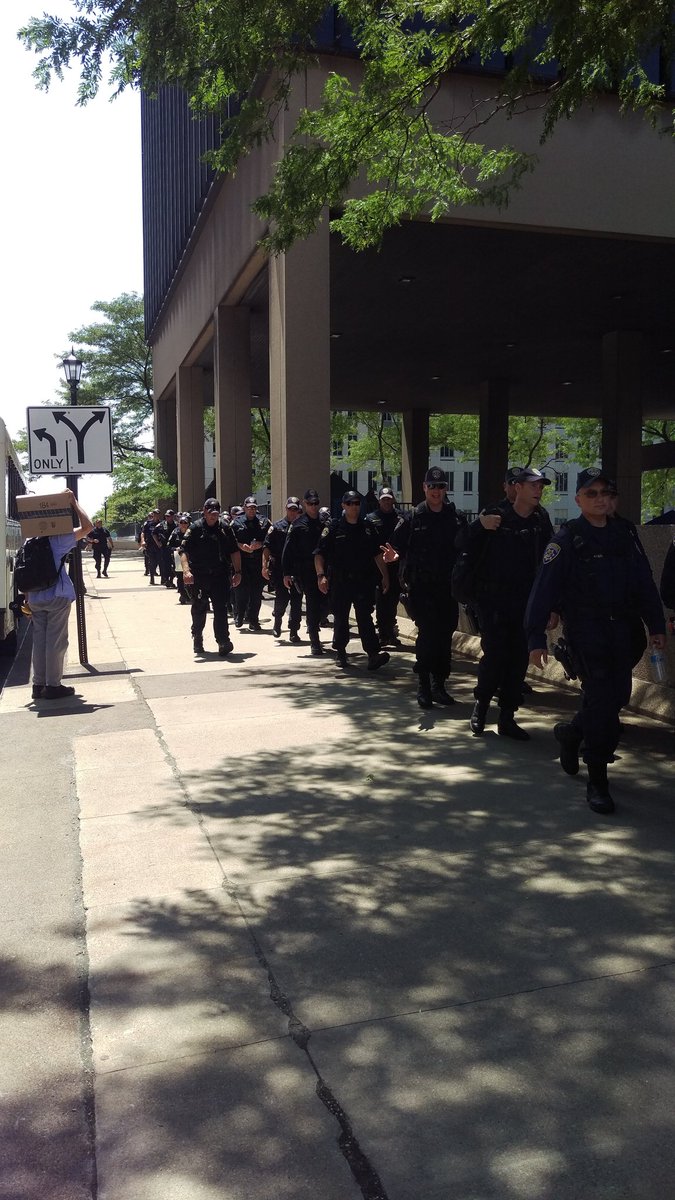
There were uniformed officers and security in riot gear holding weaponry everywhere, and police used bomb-sniffing dogs to check for explosives in packages on the street.
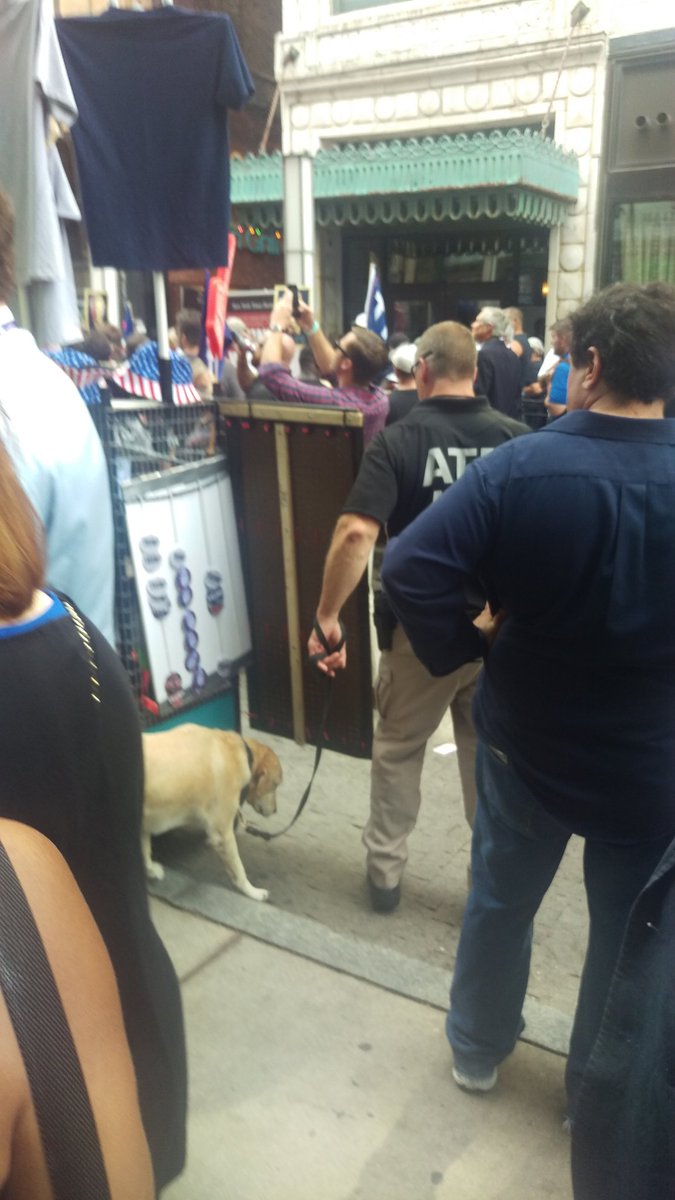
To get into the security perimeter around the arena one had to pass an extensive security check, which was more thorough than anything I’ve gone through to get onto an airplane. That included turning on smart phones to prove they were real. For the most part, the process went very quickly, but it made me reconsider how much time I wanted to spend in the arena, since I didn’t look forward to going through security every time I had to reenter.
Security was a bit less stringent at the convention center a couple of blocks away from the arena, where the print media (of which I was, allegedly, one) were penned up to write their copy. Evidently we weren’t considered high priority targets for terrorists. Rather than spending time in my designated space with the international media in the far corner of the print press room, my wife – er, camerawoman – and I staked out a position in a pub just opposite the arena entrance where I could drink some local beer, send the occasional tweet, and watch the talking heads like Meet the Press’ Chuck Todd interact with the little people. It was a taxing assignment, but someone has to speak truth to power.
https://pbs.twimg.com/media/Cn6LrhYW8AA1QDb.jpg
On the final night of the convention, I decided to watch the proceedings from the highest point in the Quicken Loan arena seats, to the left of the main stage, about level with the balloons clustered on the arena ceiling. (My media credentials limited me to the upper balcony seating.) On the way in I saw a gaggle of reporters surrounding someone who I assumed must be very important. It was Don King, the boxing promoter. He had missed out on snaring a formal speaking slot, but that didn’t stop him from talking.
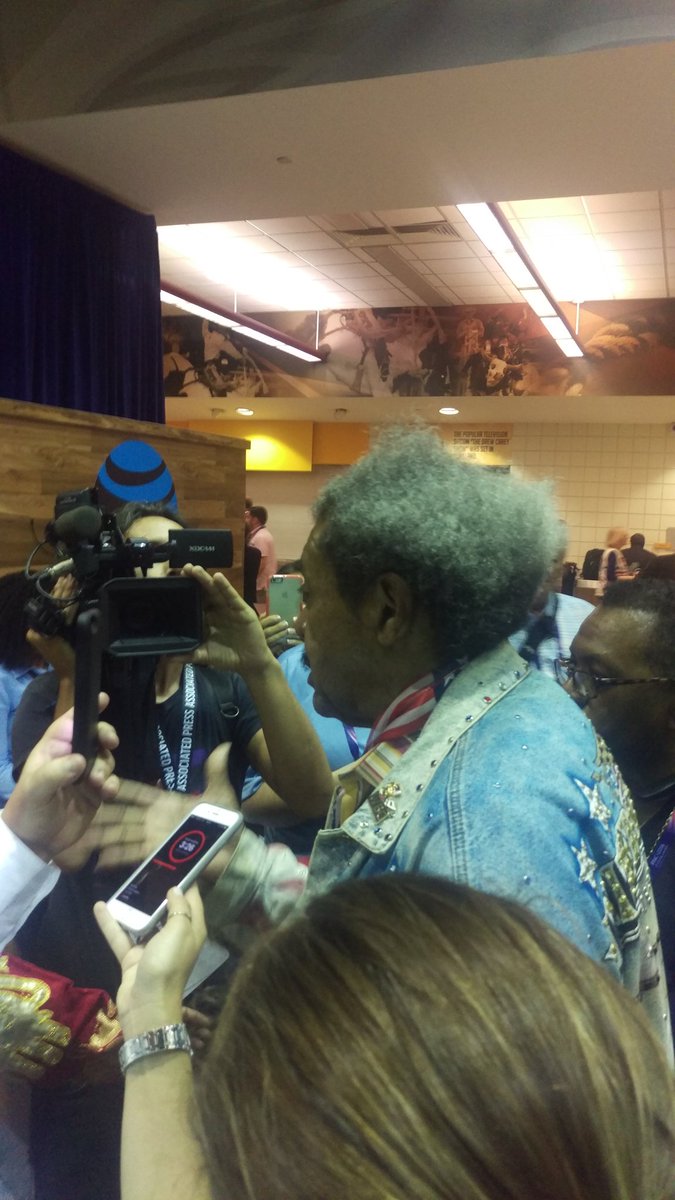
From my nosebleed seats the speakers seem quite tiny, but I had a fine view of the proceedings via the overhead screen. The most anticipated speaker of the night, other than Donald, was his daughter Ivanka, and she delivered, both substantively and in presentation. To the extent that her comments on issues like equal pay and child care reflects her father’s views, it is a reminder of how Trump is willing, in some areas, to go against the Republican Party orthodoxy in a bid to reach out to more moderate voters. Whether he succeeded is another question altogether.
When Ivanka introduced her father, the place erupted in applause and a glow of camera phone flashes as Donald walked on stage, his hair looking less unruly than usual.
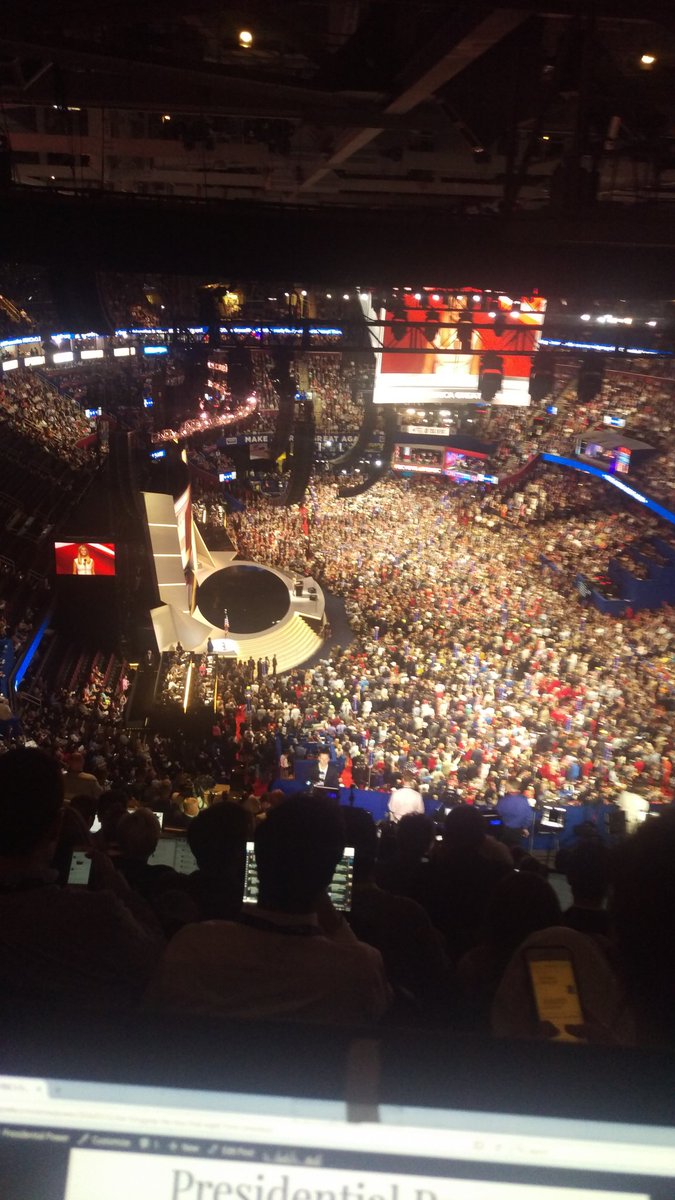
Even though I was about as far from Trump as one could be, I’m pretty sure I could have heard his speech even had there been no amplification – he practically shouted it out, which may have been partly a function of his adjusting to using a teleprompter, rather than the more informal speaking style I’ve seen from him at his rallies.
As many commentators have noted, Trump’s speech painted a rather grim picture of the state of affairs in the U.S., beginning with his opening statement that “Our convention occurs at a moment of crisis for our nation. The attacks on our police, and the terrorism in our cities, threaten our very way of life” followed by a lengthy recitation of facts and statistics chronicling just how bad the situation purportedly is. But that’s to be expected from a candidate who is running against the incumbent party – it would be more surprising if he painted a more upbeat picture. As he has throughout the campaign, Trump targeted his message to what he called “the forgotten men and women of our country. And they are forgotten, but they’re not gonna be forgotten long. These are people who work hard but no longer have a voice. I am your voice.” The reference to the forgotten men and women, of course, hearkens back to FDR’s use of that term in his famous radio address during the 1932 presidential campaign when he called for plans that “put their faith once more in the forgotten man at the bottom of the economic pyramid.” At the end of his acceptance speech, Trump repeated his claim that “I am your voice.”
As I watched the speech, one incident in particular stood out as a testament to Trump’s maturation as a candidate. As security quickly surrounded the lone protestor who tried to disrupt the speech, Trump refrained from issuing his characteristic order to “Throw him out” which I had seen so often on the campaign trail and instead, after the protestor was gone, took the time – to great applause – to praise law enforcement for their hard work without ever directly referencing the disruption.
So, what impact will the convention, and Trump’s speech, have on the presidential race? My sense is that, despite the media focus on a “divided party,” Trump accomplished his first objective, which was to unify the Republican Party behind his candidacy. (Contrary to the impression the media conveyed, when I heard delegates chanting “Lock her up” in reference to Hillary Clinton, it sounded less like an angry mob and much more like a rollicking party. Delegates were having fun with the chant – or so it seemed to me inside the arena.) And I think his message will resonate with that portion of the electorate that has experienced years of stagnant wages, and who are worried about growing economic inequality and security issues. But although he modified his stance on immigration to target countries rather than Muslims, and made a direct appeal on Thursday night to the groups, including African-Americans, Latinos and members of the LGBT community that historically vote Democrat, it is not clear to me how effective he was in expanding his electoral coalition beyond his current base of low-to-middle-income mostly white male voters. And I am skeptical that he will be very successful in peeling off very many Sanders supporters to join his cause, despite his direct effort to reach out to them in his speech. But won’t stop him from trying, as evidenced by today’s twitterfest from Trump decrying the DNC email scandal.
The other unknown, of course, is how much of a boost Hillary Clinton will get when the spotlight turns to the Democratic convention in Philadelphia this week. Ironically, despite all the media buildup anticipating a very divisive Republican convention, it is the Democrats who seem more divided at the moment, at least if the Sandersistas follow through on their pledge to bring 100,000 protestors to the City of Brotherly Love. My guess, however, is that Democrats will leave Philadelphia next Thursday more unified than they appear to be now, just as Republicans did.
Let me conclude by repeating what I told the camera crew from the Cleveland visitors bureau when they interviewed me about what I thought about their fair city: everywhere we went people were incredibly nice and helpful, whether it was the man on the rapid transit train explaining how to get to downtown Cleveland, the judicial clerk who sent me to the correct courthouse to get my security pass, or the rapid transit official who let me jump the turnstile when I lost my farecard. I know Cleveland gets a bad rap – burning rivers, Lebron James, Lebron James again, etc. (City Motto: We’re not Detroit!) But from what I saw in the brief time I spent there, Cleveland Rocks.
